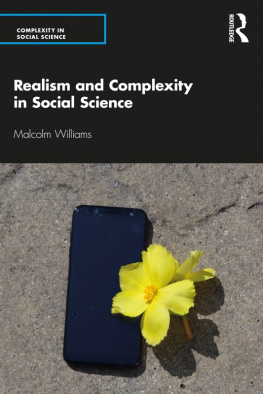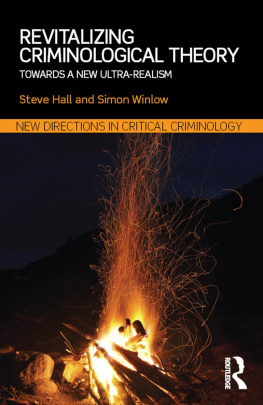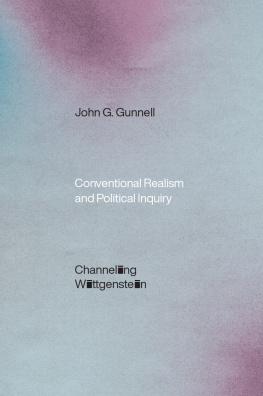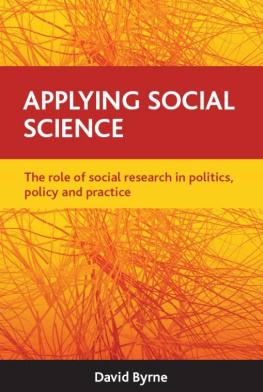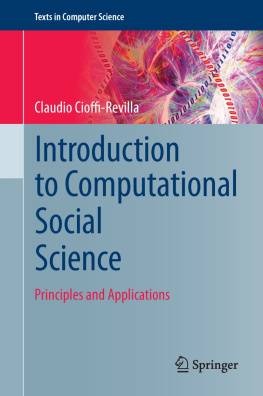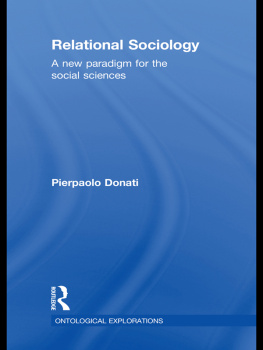
REALISM AND COMPLEXITY IN SOCIAL SCIENCE
Realism and Complexity in Social Science is an argument for a new approach to investigating the social world, that of complex realism. Complex realism brings together a number of strands of thought, in scientific realism, complexity science, probability theory and social research methodology.
It proposes that the reality of the social world is that it is probabilistic, yet there exists enough invariance to make the discovery and explanation of social objects and causal mechanisms possible. This forms the basis for the development of a complex realist foundation for social research, that utilises a number of new and novel approaches to investigation, alongside the more traditional corpus of quantitative and qualitative methods. Research examples are drawn from research in sociology, epidemiology, criminology, social policy and human geography.
The book assumes no prior knowledge of realism, probability or complexity and in the early chapters, the reader is introduced to these concepts and the arguments against them. Although the book is grounded in philosophical reasoning, this is in a direct and accessible style that will appeal both to social researchers with a methodological interest and philosophers with an interest in social investigation.
Malcolm Williams is a Professor and Co-Director of the Q-Step Centre, at Cardiff University.
Complexity in Social Science
This interdisciplinary series encourages social scientists to embrace a complex systems approach to studying the social world. A complexity approach to the social world has expanded across the disciplines since its emergence in the mid-to-late 1990s, and this can only continue as disciplines continue to change, data continue to diversify, and governance and responses to global social issues continue to challenge all involved. Covering a broad range of topics from big data and time, globalisation and health, cities and inequality, and methodological applications, to more theoretical or philosophical approaches, this series responds to these challenges of complexity in the social sciences with an emphasis on critical dialogue around, and application of these ideas in, a variety of social arenas as well as social policy.
The series will publish research monographs and edited collections between 60,000 and 90,000 words that include a range of philosophical, methodological and disciplinary approaches, which enrich and develop the field of social complexity and push it forward in new directions.
David Byrne is Emeritus Professor at the School of Applied Social Sciences, Durham University, UK.
Brian Castellani is a Professor in Sociology and Head of the Complexity in Health and Infrastructure Group, Kent State University, USA. He is also an Adjunct Professor of Psychiatry, Northeastern Ohio Medical University.
Emma Uprichard is an Associate Professor and Deputy Director at the Centre for Interdisciplinary Methodologies, University of Warwick, UK. She is also the co-director of the Nuffield, ESRC, HEFCE funded Warwick Q-Step Centre.
Lasse Gerrits is Professor of Urban Planning at the Institute for Housing and Urban Development Studies at the Erasmus University of Rotterdam (The Netherlands).
Books:
The Defiance of Global Commitment
A Complex Social Psychology
Brian Castellani
Emotions, Embodied Cognition and the Adaptive Unconscious
A Complex Topography of the Social Making of Things
John A. Smith
Realism and Complexity in Social Science
Malcolm Williams
For more information about the series, please visit: https://www.routledge.com/Complexity-in-Social-Science/book-series/CISS
First published 2021
by Routledge
2 Park Square, Milton Park, Abingdon, Oxon OX14 4RN
and by Routledge
52 Vanderbilt Avenue, New York, NY 10017
Routledge is an imprint of the Taylor & Francis Group, an informa business
2021 Malcolm Williams
The right of Malcolm Williams to be identified as author of this work has been asserted by him in accordance with sections 77 and 78 of the Copyright, Designs and Patents Act 1988.
All rights reserved. No part of this book may be reprinted or reproduced or utilised in any form or by any electronic, mechanical, or other means, now known or hereafter invented, including photocopying and recording, or in any information storage or retrieval system, without permission in writing from the publishers.
Trademark notice: Product or corporate names may be trademarks or registered trademarks, and are used only for identification and explanation without intent to infringe.
British Library Cataloguing-in-Publication Data
A catalogue record for this book is available from the British Library
Library of Congress Cataloging-in-Publication Data
A catalog record has been requested for this book
ISBN: 978-1-138-33561-5 (hbk)
ISBN: 978-1-138-33555-4 (pbk)
ISBN: 978-0-429-44370-1 (ebk)
Typeset in Bembo
by KnowledgeWorks Global Ltd.
This book is dedicated to a superb methodologist and good friend, the late W Paul Vogt.
Contents
Table of Contents
Page List
Landmarks
Malcolm Williams is a Professor at Cardiff University where he teaches philosophy and methodology of the social sciences. He is a sort of sociologist, but not a proper one and his interests lie at the boundaries of disciplines sociology, geography, statistics, social policy and philosophy of science. Over the years he has conducted research on homelessness, living alone, counterurbanisation and the barriers to learning quantitative methods in social science. This suggests he is either eclectic, or has a low boredom threshold! His favourite areas to work on are more philosophical and methodological and include probability, representation, objectivity/subjectivity and how these play out in realism and complexity, which is of course what the current book is about! He has published several books in philosophy and methodology, most recently Key Concepts in the Philosophy of Social Research (Sage 2016) and Objectivity and Subjectivity in Social Research (with Gayle Letherby and John Scott, Sage 2013).
https://www.cardiff.ac.uk/people/view/38062-williams-malcolm.
Does the study of social complexity feature a naturally-given epistemology and ontology? Arguably not (yet) but not many scholars seem to be acutely aware of this, so there is still a considerable mountain to be conquered. Since at least the 1990s, Malcolm Williams, Professor at the School of Social Sciences at Cardiff University (UK), has been at the forefront of climbing this philosophical mountain. The current book is the latest edition to the journey, some parts summary, others a rethinking of previous climbs; and still others entirely new climbs altogether.
Still, a topic as broad and vague as social complexity comes with a rather steep ascent; and so is not so easily climbed. Questions about the nature of reality are not new of course. For as long as people have thought about what makes the world tick, they have asked questions about what of this world can be known and how it can be known. The advent of the complexity sciences gave momentum to explore these questions in new directions. Williams recounts how he himself walked into this territory in response to the still-popular but ultimately false dichotomy between the school of thought that believes that social reality can be measured, assessed, and known directly and without further consideration all you can see you see is reality and those who adhere to the school of thought that such an endeavor is simply impossible, and that one is limited to discussions of perceptions of reality nothing you see is real. It is between those two extremes that the most interesting things happen and that is where Williams work is positioned.
Next page
